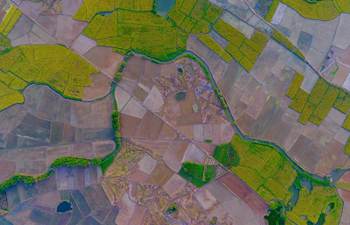By Xinhua writers Liu Wei and Zhao Yeping
HAIKOU, Aug. 9 (Xinhua) -- Lu Gang can still recall his first sighting of a bee-eater eight years ago as his train pulled into Haikou station in Hainan, China's southernmost tropical province. When he got off the train and went to look for the colorful bird, he found dozens nesting in a sand bank near the station, mostly the chestnut-throated variety, but with a few blue-throats.
As a birder and a conservationist, Lu is fascinated by bee-eaters. Every year since 2010, from March to July hundreds of bird watchers from across China have come to see them.
"The bee-eater is an indicator of how well we have protected our wetland and environment," said Lu, who has worked to protect the forest and save locally endangered species for a decade.
According to Hainan Birdwatching Association, Jinsha Bay in Haikou, the main breeding ground of bee-eaters, faces many threats. Encroaching urban development, pollution from farming and sand mining have done untold damage to the birds' habitat.
A recent real estate development worries Lu and other bird-lovers, with nearby ponds and marshes set to be drained.
"I have studied waterfowl for ten years, and I find the number of winter migrants in Hainan to be declining, though the island is covered in thick forest and home to one-third of China's birds," Lu said. He attributes the decline largely to real estate development and quarrying.
Conservationists, environmental volunteers and birders are well aware of the threats and are constantly making press statements or reporting problems to the government, but the development continues.
"We won't just stand by and watch these birds perish, but it is the government's decision whether to call a halt to the destruction or to allow it," said Cheng Cheng, director of the birdwatching association.
Such reports are taken seriously by the Haikou city government. In 2016, it investigated the shrinking bee-eater habitat and put an end to illegal quarrying.
An eight-year plan to restore wetlands was issued in June. One wetland nature reserve, seven parks and 45 wetland communities will be set up. Jinsha Bay is on the list.
In China, both government and people have been galvanized into raising preservation of nature as its priority of development. A greener environment is a new goal and the government has emphasized the need to preserve biodiversity.
The government has paid great efforts in conservation and could draw on the experience of people and organizations with expertise in specific programs such as the bee-eater protection, added Lu.
While the wetland plan goes out for public consultation the conservationist Paradise Foundation is sponsoring 18 individuals and organizations to privately protect areas using new technology, capital and their wealth of experience.
Lu was one of those chosen for this work and he immediately recommended that the local government establish a privately protected area in Jinsha Bay. "If both development and habitat protection are handled properly, the bee-eaters will flourish while, surrounded by a vibrant environment, the real estate will be worth much more," said Lu.
Haikou is keen to work with the foundation to put the wetland plan into practice, protecting and restoring its 29,000 acres of wetland, said Zhang Qi, secretary of the CPC Haikou municipal committee.
The Paradise Foundation helped found the country's first land trust reserve in Old Creek Nature Reserve, a giant panda habitat in Sichuan Province. Through purchasing a variety of leases, the foundation and the government have put 110 square kilometers under protected status. The reserve not only protects the environment and various species, but has introduced sustainable farming.
Lu is confident of founding more wetland communities in Haikou,including as many places as possible into the plan.
"The government is on our side, setting aside land as privately protected areas and promoting this model across the province," he said.

















